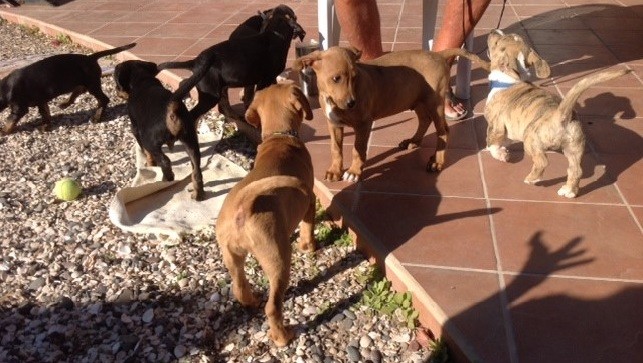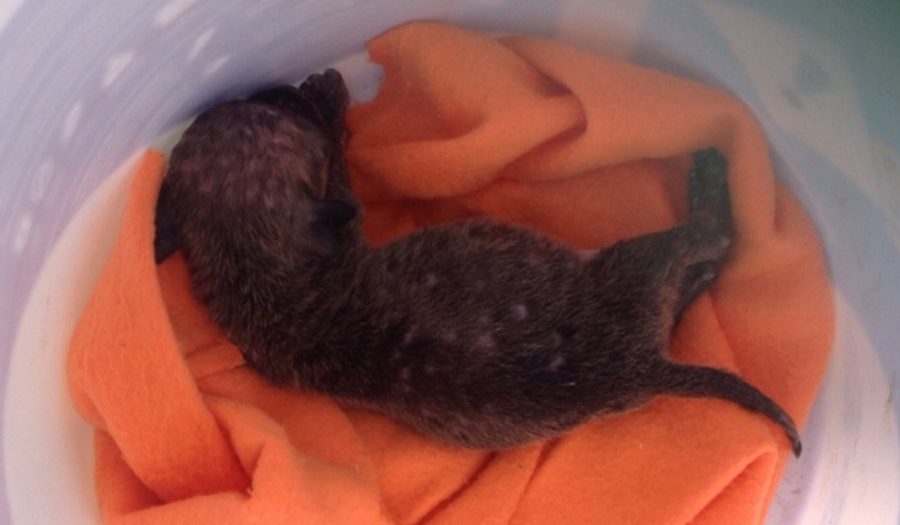By Al Strano
Posada Concepcio?n is a small beachside community of North Americans seeking the warmth of Baja Mexico’s winters, a.k.a. “snowbirds.” There are a large number of pet owners in the park and surrounding beaches as well as the larger Mexican village of Mulege?. To support the number of dogs and cats P.A.W. has been established to provide veterinarian care. Local vets and volunteers, as well as the occasional visiting vet, all manage the clinic, which is located between Posada and Mulege?.
One day in late November, 2019, an event was to take place that eventually involved a fair number of Posada residents. A mixed-breed female, possibly containing some long haired dachshund blood, was brought into the clinic. The dog was suffering from the effects of giving birth, four days earlier, to a litter of 14 pups, 3 of which had since died. She had been brought in to be spayed, to check an infection from birthing and to see if she was able to continue raising her pups. While on the operating table, she sadly passed away. Several of the volunteers present were residents of Posada and were heartbroken to see this courageous mom pass away. Grief aside, one of the women asked, “What about the puppies?” The vet’s response was, “They’ll probably die.” When the owner came to take the deceased mama dog away, she brought the eleven pups with her in a box. The vet was amazed how healthy they were. “The mom did a great job nurturing them and giving them a good start in life. But now they’ll need a lot more care. Who will do that?” One of the ladies, who hails from New Mexico as well as other places and already had three dogs of her own said, “I’ll take six.” Another Posada women who comes from Washington by way of Canada replied, “Are you crazy? What will your husband say?” So she took three of those six, leaving five to stay with the local family.
The commitment was easy to make, but a lot lay ahead for these generous souls. What to feed them? how often? and how long? There was advice from the vet and information on the internet. Cows milk was not an option, baby formula might work, but the best thing was goats milk. Since there were several goat ranches in the area, it was easy to obtain. ‘How often’ was kind of left up to the pups, especially at night. First it was every two or three hours, then more time in between as the pups got older. The two fostered trios were handled differently. In one case, they slept in a caregiver’s bed in a basket; her husband was banished to the sofa. A thermos of preheated goats milk was ready to go. When the time came, three bottles were filled and each pup was wrapped in a cloth and fed from a regular size baby bottle. It was important to wrap the pup’s paws inside the cloth to prevent them scratching their faces, trying to grab the bottle (remember, they were still blind). After feeding, it was necessary to stimulate bowel movement by rubbing their tummies. The mother dog had done this for the eleven puppies, which was proved by the fact that they were in good condition with which to begin. The soiled cloths required a lot of laundry. This was provided by a nurse from Alaska, who was also a daytime puppy caregiver. Her daytime partner was a woman from Canada via Jamaica who shared the daytime feeding.
At some point, a newspaperman from California decided he wanted to adopt a puppy, naming him Sport, and to help establish a bond he began taking part in the bottle feeding. He also left one of his t-shirts for the dog to sleep on.
The other group was handled by the husband of the lady from New Mexico. The method varied slightly, but the results were the same.
After ten days, the pups opened their eyes and became more mobile. Each group of three were able to be fed simultaneously, as they continued to grow bigger by the day.
Meanwhile, at the five week stage, the nighttime bottle feeding was terminated. The pups were started on a puppy chow with lactose free milk mixture, thereby able to feed themselves.
Around the same time, the Canadian and Alaskan visited the Mulege? town pups. The first thing they noticed in the modest village home was a tiny rib cage bag-of- bones with bulging eyes, shivering in a patch of sunlight. The women’s hearts stopped. How could such a tiny, skinny little creature be truly alive. After a brief exchange of words they both decided in unison “we can’t leave them here.”
The gracious Mulege? family was willing to lend them two of the tiniest puppies for extra nourishment for a two week trial. Two puppies came home with them that day, Snoop Dog and Mila. A tablespoon of goats milk every hour for the first day and both tiny creatures were still breathing in the morning – a miracle. One could imagine the pups pleading, “More goat milk please.” The days were filled with tiny feedings and hours of TLC, observing and nurturing. The caregivers commanded themselves to watch the sky for birds of prey and watch the ground for cats. In two weeks, a stronger larger Snoop Dog rejoined his 3 litter mates in town.
The original plan was to foster the pups until they were big enough to be adopted. This plan was slowly amended, whether on purpose or by natural progression. Most of them would be adopted by the caregivers. The fact that the seven in Posada had all been given names was sure indication of attachment. The couple from New Mexico adopted Gabby, Poncho and Budda. Budda was supposed to be Cisco, but became so fat they changed the name to Budda. Sugar and Chica were adopted by
the Washington couple and Sport by the California newspaperman. Mila, took a little longer, her caregiver was reluctant to take her to Alaska, but eventually she came up with a solution. Mila, which is short for Milagro (the Spanish word for miracle), because it was a miracle that she survived, would be taken to her son in California on her way back to Alaska in the spring, then pick her up on her return trip to Baja in the autumn. That took care of all the Posada puppies.
However, two weeks later, after consulting with the Mulege? owner and at her request, the remaining four were brought to Posada. For a short while two sets of caregivers had four pups to deal with, including Snoop Dog. This didn’t last long. A young, pie making woman from New York State agreed to foster them and after a visit to Buenaventura’s Taco Tuesday she returned with only two, as two were adopted by people on Santispac Beach, then quickly one more was adopted by some folks on Coyote Beach. The fourth pup is currently being fostered by another Posada couple.
All the pups have continued to receive excellent care, including shots, and are scheduled to be neutered at the end of March.
Meet The Puppies

(Poncho, Gabby, Chica, Budda, Sugar and Sport)

(Mila at 5 weeks after rescue)
For a month or more, Mila went everywhere with her caregiver, in an apron, a pocket, purse, sling bag or bucket. Her penthouse bedroom was a 5 gallon bucket that became a familiar site at Posada. The bucket baby got around.
Today Mila is a happy, cheerful, bouncing brindle puppy. A friendly sweet socialized member of Posada dogs. Friendly Posadians have encouraged and supported Mila’s efforts into becoming a recognized individual with a quick mind, a huge heart and a sweeping wag for anyone who says hello.
Sugar is honey brown with possible hound dog mixed in. She is very alert and inquisitive, a nose that seeks out every smell, very sweet and gentle, but on her own terms. She will probably be a medium sized dog.
Chica is multi-colored black, reddish brown and white. She definitely has some dachshund features. She is sweet and gentle and will cuddle, if her sister leaves her alone.
Sport has a brindle coat, a striped pattern, and is called Tigre by Mexicans. He is slightly smaller than his sisters. He is very fast on his feet and a match for any other dog, even if it is much larger than him. He will be going to California for the summer and returning to Posada in the fall.
The other three were raised in a freer environment with a large fenced-in area and a doggy door. One of the older dogs of the caregivers taught them to run, play and dash in and out of the house. Gabby is a black female. She was named so because she yapped all the time. Pancho is a black male. Budda is a brown male, similar to Sugar. He is bigger and fatter than the others, but has a meditative calmness to him.
Snoop Dog was adopted and went home to Alberta.
The saying “It takes a village” was never more appropriate to the raising of these puppies.
